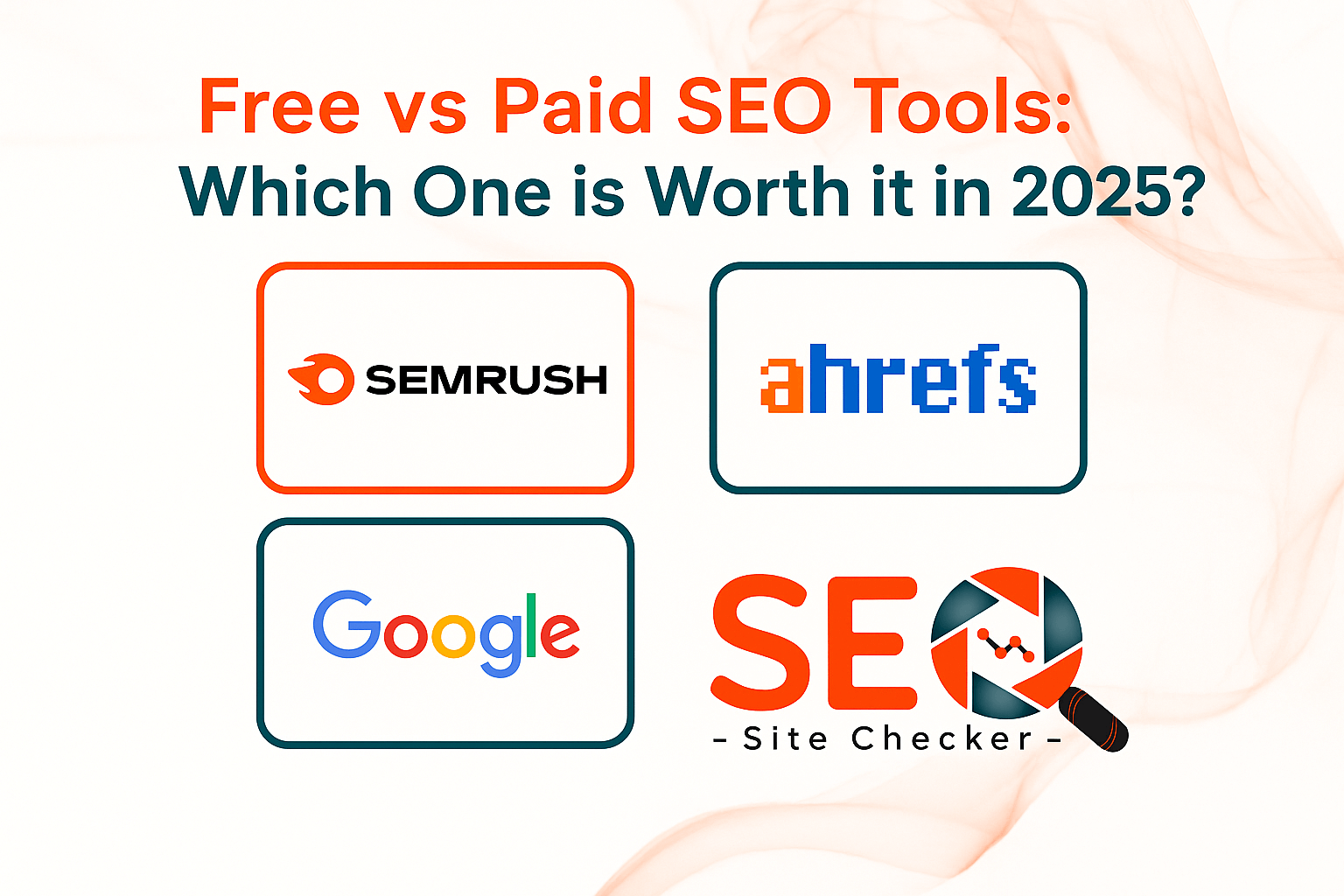Free vs Paid SEO Tools: Which One is Worth It in 2025?


Search engine optimization (SEO) remains one of the most important drivers of traffic, visibility, and sales in 2025. Whether you’re a freelancer, small business owner, or marketing agency, the tools you use can make or break your SEO strategy.
But here’s the big question: should you rely on free SEO tools, or are paid SEO tools worth the investment?
This guide breaks down the pros and cons, helping you decide with a clear SEO tools comparison — and a final recommendation for your business.
What Free SEO Tools Can Do
Free SEO tools are everywhere, and many of them are surprisingly powerful. In fact, Google itself provides some of the most widely used free SEO tools, such as:
- Google Search Console → to monitor search performance.
- Google Analytics 4 (GA4) → for traffic, engagement, and conversion insights.
- Google PageSpeed Insights → to check website performance and loading speed.
On top of that, platforms like SEO Site Checker provide dozens of free tools including:
- Website SEO Score Checker – get a full SEO audit instantly.
- Domain Authority Checker – measure your site’s trustworthiness.
- Meta Tag Analyzer – optimize on-page metadata.
- Image Compressor – speed up site performance.
Benefits of Free SEO Tools
- Cost savings – ideal for startups and students.
- Beginner-friendly – no steep learning curve.
- Instant results – quick audits and checks without long setup.
- No commitments – try multiple tools before choosing a stack.
- Accessibility – most work directly in the browser.
In short, free tools are perfect if you’re just starting out or managing one website.
Limitations of Free SEO Tools
As useful as they are, free tools often come with trade-offs.
1. Limited Data Access
Free SEO tools may only show a fraction of the available data. For example, free backlink checkers may cap results at 50 or 100 links, while paid tools provide the full picture.
2. Usage Restrictions
Many tools have daily caps. For example, on SEO Site Checker, guest users can run up to 10 requests per day, while logged-in users get 50. File uploads are also limited (10 MB for guests, 50 MB for logged-in users).
3. Fewer Advanced Features
Free tools are excellent for audits, basic keyword checks, and speed testing. But when you need advanced features like competitor analysis, rank tracking, or keyword gap insights, free options won’t be enough.
4. No Deep Integration
Free tools usually don’t integrate with CRMs, content management systems, or data visualization platforms — a must-have for agencies managing multiple clients.
What Paid SEO Tools Offer
Paid SEO tools go beyond the basics by providing comprehensive data, automation, and insights. Leading platforms include:
- Semrush – all-in-one SEO, keyword research, content marketing, and competitor tracking.
- Ahrefs – backlink analysis powerhouse with keyword and site audit tools.
- Moz Pro – solid all-rounder with beginner-friendly dashboards.
Advantages of Paid SEO Tools
- Full Keyword Databases → Semrush and Ahrefs track billions of keywords worldwide.
- Competitor Analysis → See where rivals rank, what backlinks they have, and which keywords they’re targeting.
- Backlink Profiles → Identify link-building opportunities with complete backlink data.
- Advanced Rank Tracking → Monitor your keyword positions daily across multiple locations.
- Team Features → Agencies and enterprises can add multiple users, share reports, and manage campaigns at scale.
Simply put, paid SEO tools are designed for those who want to scale their SEO beyond the basics.
Which Businesses Should Use Free Tools
Not everyone needs a $120/month Semrush subscription. In fact, for many businesses, free SEO tools are more than enough.
Free tools are ideal for:
- Freelancers and students – learning SEO and testing strategies.
- Small business owners – optimizing their website without a big budget.
- Bloggers – checking site speed, basic keyword rankings, and metadata.
- Startups – running audits before investing in paid platforms.
Example: If you run a personal blog or a small e-commerce site, tools like SEO Site Checker give you everything you need to optimize content, compress images, and monitor SEO health — without paying a dime.
Which Businesses Need Paid Tools
Paid SEO tools become essential once your business scales or your competition grows fierce.
You’ll likely need paid tools if you’re:
- Digital marketing agencies – managing multiple clients.
- Enterprises & SaaS companies – competing in tough, global markets.
- E-commerce brands – where organic visibility directly impacts revenue.
- Content-heavy publishers – needing keyword tracking, SERP analysis, and content gap insights.
For example, if you run a multi-location business, you’ll want rank tracking in multiple regions — something free tools don’t provide. Similarly, if you’re building large backlink campaigns, you need Ahrefs or Semrush for full backlink data.
Conclusion – Free vs Paid SEO Tools (with Recommendation)
When it comes to free vs paid SEO tools in 2025, the answer depends on your goals.
- If you’re a beginner, freelancer, or small business, free tools like SEO Site Checker cover most of your needs. They’re cost-effective, beginner-friendly, and give instant results.
- If you’re an agency, enterprise, or e-commerce brand, investing in paid tools like Semrush or Ahrefs makes sense. You’ll gain deeper insights, scalability, and competitor tracking at a professional level.
👉 Our recommendation: Start with free tools like SEO Site Checker to master the basics. Once your business grows and you need more advanced features, consider upgrading to paid platforms.
Frequently Asked Questions
Frequently Asked Questions (FAQs) is a list of common questions and answers provided to quickly address common concerns or inquiries.
Q1: Are free SEO tools enough?
Q2: Do small businesses need paid SEO tools?
Q3: Which is the best paid SEO tool?
.png)
